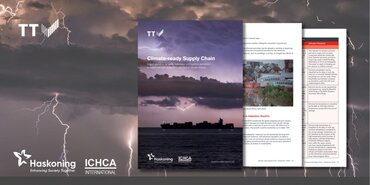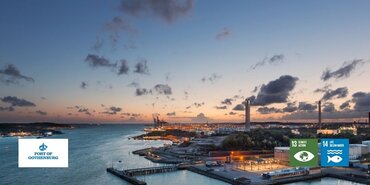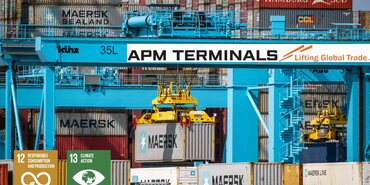Kind Leadership with Stuart Edmonston and Steve Cameron

As a mutual provider of insurance and risk management services to the global supply chain, TT Club's mission is to make the transport and logistics industry safer, more secure and more sustainable. A key part of achieving this mission is supporting innovation in leadership.
That's why Josh Finch, Logistics Risk Manager invited Steve Cameron - a member of the Maritime Professional Council and Stuart Edmundston, Safety and Risk Management Director for UK P&I Club to discuss the concept of kind leadership, on our podcast, TT Live.
Josh first spoke to Steve. Steve trained at sea with a shipping line operating around West Africa. He also ran a consultancy for a number of years and today, is a member of the Maritime Professional Council.
So what is kind leadership?
Steve: To a lot of people in the maritime industry, it is a new concept, but it's been accepted across other industries for more than 25 years now. There's clear research on kind leadership that shows the benefits it can bring to any organisation. It's a leadership style that includes empathy, compassion, and understanding in guiding and managing others. Leaders who practice kind leadership prioritise the well-being and development of their team members, and this fosters a supportive and inclusive environment.
So why do you think that we need kind leadership?
Steve: This came about as the result of some work we were undertaking at the Maritime Professional Council. The Maritime Professional Council is an umbrella body bringing together all the maritime organisations so that they act in a cohesive way. We were doing some research while involved in discussions of the review of the regulatory training of officers, known as a 'STCW'. A number of the people that were involved were expressing concerns that it wasn't sufficient, it was too technical and perhaps out of date for today's needs in terms of leadership. So I carried out a series of one-to-one interviews for a pilot study, and the message was pretty clear: people were saying that STCW is a bare minimum - it's dull, and it's not working. Leadership should be about direction, inspiration and guidance. Enter kind leadership. We decided that this could provide the solution that the industry needs. That just left the challenge of trying to explain what it meant - we've been through a number of iterations now - and getting the industry to adopt it.
So whom did you survey?
A survey went out with the Nautical Institute. We were focused mainly on seafarers - they are the ones that are in best place to talk about their training needs- but it also included ship owners, ship managers and other professional maritime organisations. Across the board, and we were pleased to get a cohort that was representative of the industry in general.
We did a bigger study with the Nautical Institute and out of 100 respondents, 88% said that the industry needed kind leadership. So we could tell that this was something that needed to change.
Josh: Now, kind leadership is an interesting concept, especially because it's quite counter intuative, particularly in the maritime world, to a traditional authoritarian view of leadership: the sea captain is in charge and all instructions have to flow through them. They may not be the nicest person in the world, or the most respectful, but they know what they're talking about, and ultimately are the font of all knowledge - and he must be respected. So kind leadership is a deviation away from that, very traditional, type of leadership.
So, how do you reconcile that in a maritime environment?
It's still largely true today, but when I went to sea, your levels of authority were dictated by the number of stripes on your arm, and everybody knew exactly where your authority started and finished. And mostly it still is an authoritarian leadership style, although as part of this process, we were delighted to find a number of enlightened companies that have adopted this kind leadership approach. But this reconciliation question was one that came up a lot in the studies we conducted - how could it possibly be applicable?
How can you teach somebody that is authoritarian to be a kind leader?
Steve: The answer to that is that the two are not mutually exclusive. A good leader adopts both styles so that when the chips are down, they are an authoritarian leader. He or she tells people what they need them to do and expects them to do it. So a good leader switches between those two different management styles. During standard operations, a kind leadership approach can help build trust, boost morale, encourage teamwork, engaging positively with crew members, listening to their concerns, generating this attitude of mutual respect and cooperation so that when the chips are down and you tell somebody to do something, they don't do it because you've told them, they do it because they want to.
During standard operations, a kind leadership approach can help build trust, boost morale, encourage teamwork, engaging positively with crew members
So we're talking about in crisis situation, for example, the ship is on fire. In that scenario, a leader has to embrace a different style of leadership - it's got to be very authoritarian and everybody must do what they're told immediately. But that is reinforced by the kind leadership that happens during non-crisis situations. So it's a mutually reinforcing styles of leadership.
Has this had an effect on the profitability of operations? Has research een conducted on this?
Absolutely although most of the research has been carried out in other industries - especially in America. As a consequence of the studies with those organisations, they've been able to identify that an approach like this, i.e. kind leadership or using emotional intelligence, enables companies to be more effective for the reasons that we just outlined about - boosting morale etc, which adds to the bottom line.
A team membern that's been working on this, Captain John, (someone who's spent a lot of his life as an ex-sea captain training people on leadership), did some work with a large ferry operator on the west coast of the States who had a number of problems. They were havinga lot of accidents, a lot of churn of people, and their services were unreliable. Capt. John came in, spent some time with the senior leadership team and explained to them what they needed to do. Luckily they recognised that this wasn't a quick fix and it was going to take a couple of years to amend. But they went through the journey together, and as a consequence of their hard work in amending their leadership styles, their staff stayed. They were more committed to the job, more motivated. Accident rates came down, the ships and service became more and more efficient, and they actually began to gain more customers. That all flowed through to the bottom line.
Back to Josh: That was certainly my experience: I ran a number of different warehouses in my professional career. Perhaps not quite as authoritarian traditionally as a ship, but still quite an authoritarian environment traditionally. I have to say my experience was exactly what you've just described: I would watch different managers' styles of leadership, different supervisors' style of leadership, and they absolutely would drive away the best, particularly the highest performing staff, who would not put up with it and would leave. Meaning you're left with the worst performing staff, constantly retraining new staff, with a training budget through the roof. Accidents increase, as new employees don't know necessairly know what they're doing - or they're sometimes not the most competent people because this is the best job that they can get. So you absolutely want to attract and retain those highest caliber people - and it seems a kind leadership can significantly help with this.
Would you say that this is universally applicable?
Steve: If it's effective across a range of industries and been tried and tested in America, it's a style that can be adopted for any organisation, any type of business. In fact, I almost feel like the ship is the extreme example here; If it can work on a ship, surely it can work anywhere. Think about some of the more extreme sorts of environment that are very top-down, and I can't think of a single example that's more extreme than a ship environment. If it works there, it must be able to work anywhere.
it's a style that can be adopted for any organisation, any type of business. In fact, I almost feel like the ship is the extreme example here; If it can work on a ship, surely it can work anywhere.
If you were a small company and you were looking to implement kind leadership as a management theory or methodology, how would you start?
Well, we've yet to put together the structure here, but you'd need first to map out what your values are as an organisation. What's important? What is it that you want to deliver to your customers? How do you want to look after your people? How do you want to develop them? Understand those, then you then need to take cultural considerations into account, because the cultures of companies are different around the world, and you may have a company where you've got a mix of different cultures - just as you have on board a ship - and that needs to be taken into account too.
And when it comes to the management of change, well we all know it can be quite difficult. You might have a team of people that are evangelical about change in your organisation, will go the extra mile to achieve what's needed, but without the buy-in from the chief executive, you're wasting your time. So it doesn't matter whether you're talking about leadership, risk and safety, mental health, it all stems from the commitment of the chief executive to make it happen.
Then you need a bottom-up approach when it comes to writing the training programs and implementing it little by little - perhaps having a platform in your organisation where you share best practice. But it's a journey and it has to be embraced at the top. I think that there's something to be said too for different personalities within an organisation - making sure everyone is playing to their individual strenghts as leaders. You'll get some people who are strong in one way or one style of leadership: you get people who are data-driven, people who are very socially driven, people who are very top-down and action-oriented. All of these people complement each other, everybody has their own skill set and their own approach. There's no wrong way as such, as long as all of the ways have their place and are seen to be a strength in certain scenarios.
Any other thoughts on kind leadership?
We're still on a journey with kind leadership. We now face the challenge of getting it accepted by the industry, both at sea and ashore. And I think it's important to point out that this only works if it is adopted ashore as well as at sea, so both sides of the organisation share the same cultural values. Otherwise, the two are going to be speaking against each other. So it's important that ship ownership operators, ship managers, not only invest in training their sea staff, but invest in training their own people to share the same values. And as a consequence, they'll get a lot more benefit from the process.
I think that the way that we treat our people is just integral to the way that we run our operations and to what we get out of operations as well. There is nothing more important than that.
I think it's important to point out that this only works if it is adopted ashore as well as at sea.
Introducing Stuart Edmundston.
Josh: As I've said, Stuart is the Safety and Risk Management Director for UK P&I Club, but he is also a former Master Mariner and has held senior positions on board ships. He's now head of the safety and risk management department at the UK P&I Club, where he leads a fantastic team of experienced individuals.
What was your leadership experience on the ship?
Stuart: So I first went to sea in 1992 as a deck cadet - a normal sort of route to being an officer in the Merchant Navy. I started at just 17 years old and so I've experienced different types of leadership styles, some more enjoyable than others all throughout my 14-year career at sea.
And of course, you consciously and sometimes subconsciously, work out what sort of leader you want to be going forward. So on a ship, it's a relatively small place. You've got a very small number of colleagues in a small area for sometimes six, seven months at a time. And so leadership, and this is where mentorship comes in as well, becomes an important area and a very intimate relationship. I saw firsthand when you did have an individual in charge who lacked good skills, where the productivity of the team, the happiness of that group, would diminish very quickly if there was someone in charge who wasn't very "good" at leadership.
You started back in the 1990s, has the theory of leadership has changed quite dramatically in the meantime since then? And what does this mean to you as a former leader on a ship, as a leader today?
I think it's about having awareness - we're all individuals. If you look into the environment on a ship, you have to be alive to people from varying different cultural backgrounds, but also what they expect when they go aboard ships. Some take to being away from home a lot quicker than others for example. My personal experience is that I suffer hugely from homesickness. But we didn't speak about it when I was at sea, it was almost taboo. No one ever when I was having issues - and I pick homesickness because it was debilitating at somepoints - but no one ever put their hand on my shoulder and said: "look, we've all suffered from this, Stu. Do you want to have a chat?". If we had something like that, a leader in charge who was more open and understanding, I think we would have had a happier time.
Why should I as a leader care about the happiness of my crew or my team?
Stuart: Well, the beauty of my job now at the UK Club is that I have had the opportunity to talk and discuss with other industries: aviation, railroads etc. and I think it's becoming an accepted science, that happiness in your work will produce a more productive environment - and of course that has a direct link to profitability. So, you could almost argue that even the most severe of CFOs now understand that a happy and relaxed place of working where people are invited to speak up is a profitable one. If a colleague thinks our operations are not happening in a safe way or in a proper way, they're encouraged to speak up. If we are happy and we feel supported by our leaders, business will be profitable. I think that's, happily accepted by most, if not all, major industries.
Did you ever experience leadership that led you to feel in that way, that sort of debilitated in a way?
I think the beauty of having been to sea in those situations is that you can call on past experiences. So there were experiences where you'd have a chief officer who is a cadet, and most of these episodes that I had, you're leaving a normal environment with your parents and your siblings, and you're suddenly in this, certainly when I was at sea, "man's world", for want of a better term. You are quite upset and excited about the career you're going to go on, but suddenly you're in this real situation. I've had experiences of good chief officers, who realised or probably were reminded of their time coming on ships and were very supportive. And by supportive I don't mean have time off or time to sleep more. It was more that you had someone to talk to and an open door policy if you felt particularly upset.
The debilitating side of it is concerning because now I work with the UK Club, and I know from experience, that if you're not fully aware or fully there in your mind, there are a lot of very high-risk operations that take place abord ships, be it a mooring operation coming into port, navigating through the Dover Straits or the Singapore Straits. If you're not there mentally, the risk of something bad happening is high or higher. People's lives are at stake and potentially your own life, if you're operating machinery and you're not there mentally.
Now, whether that's homesickness or something potentially more serious than that, you shouldn't be doing that job. You should be seeking assistance and there should be a mechanism within the management on board the ship and ashore to deal with that. It doesn't mean to say that you're not the right person for that job; it just means that you need some support in that area.
As we've moved away from the command and control style of leadership, has something been lost? Is there still a place for that in leadership?
You see it in the military, and I'm sure you see it in aviation when you're landing or taking off in different conditions. At Heathrow, the leadership style changes. Going back, you'd have a captain, that you were encouraged never to speak to because that was his style. He wouldn't want to, he certainly wouldn't encourage a junior officer to speak up on the bridge if that junior officer saw something that he or she thought was dangerous. And in the same breath, if there is something going wrong, you'd want the more experienced person to be the person of authority: "you have to do this and you have to do it now". So there's a time and a place depending on the situation, whether that's navigating the ship, maneuvering alongside, or in an emergency situation on board where there's a fire potentially in the engine room, say, and you want direct and strict. People need to do what you tell them to, and they need to do it now, or in order to do these different leadership styles, depending on the situation, and I think the military does that fantastically well.
When you're being shot at, you don't want someone who's open to discussion on the situation. You want someone to lead.
Josh: You're absolutely right to point out the military in this case. I think that they've really perfected this, but I think even within those situations, they need to move fluidly between leadership styles, because even while a crisis is going on, you need to be taking in information from those under you who potentially have different perspectives on the situation on the ground, in order to understand and make those command decisions, to stay apprised of the situation, so that you're taking the best decision possible.
Stuart: A very fluid mental state is required in those cases. I think a good example of this would be an arrival into port where none of the ship's complement have visited before. You'd have a passage planning brief, where everyone would be encouraged to ask and chat and discuss, from the captain to the most junior of the bridge team with an explaination of what we expect is going to happen. But, say the wind speed just increased, the ship's meters away from the berth and a rope has to be put out now, there's no time for discussion or a debate, but there might be an opportunity later to go back to the softer leadership: "Well done, guys. That was great. How about doing this? How about tightening up on that one?" That's the area that we can improve on in the shipping industry - and we have made attempts to do just that.
In the UK Club, we've partnered with the world's leading civil aviation trainers, Canadian Aviation Electronics, to run a course. One of the modules on this course is on leadership styles, and that's where we are looking to learn from the aviation industry, where out of necessity the people flying the plane and those further back in the plane are trained in this leadership style to the very best.
Josh: In our discussion with Steve earlier, we talked about how kind leadership actually reinforces a more command and control style of leadership. Do you have a view on that?
I think there's always room for kindness, especially if you can show that you've been there yourself. I've got a son who's just embarking on a career at sea, a cadetship, and maybe it helps that I've been there and done it myself - albeit 32 years ago or so, but he's excited, and I think that the shipping industry as a whole is in a better place to welcome him on board as a young 19-year-old. They're more alive to the needs and wants of younger people, so I'm confident that it's getting better. Kind leadership for me is that there are people on board who appreciate or are open and aware of the needs of the whole team, whatever their backgrounds. Some are more equipped mentally, some not so much. Some are more driven, some are more culturally aware. I've taken a lot my learnings from other people into where I am now, ashore and going home every night, happily. So I think what I've learned there has stood me in good stead.
It's about building that trust with your team, isn't it? Once your team trusts you, then it becomes so much easier to give those kinds of instructions and to potentially deal with those crisis situations. It's concentrating on the small things. You can get overwhelmed sometimes with the big picture and the long-term strategies and all those lovely corporate-type wordings. But if you concentrate on the small things, I think you're going to go the right way. What I mean by that is birthdays, religious celebrations, weddings, or it doesn't have to be something as high profile as that. It could just be just being aware of those things that might not affect you or the business directly. But as a leader, if someone needs to spend some time off or spend some more time in the office than not, you have to be open.
Any thoughts you'd like to leave us with on kind leadership?
All too often, you hear about people retiring and tragically suddenly departing. What you've got to think about as a manager or person of authority within a team is how do you want to be remembered? When you retire you want to be remembered as the guy or gal who was great, who understood, who led a team and understood all the individuals and respected the needs of those individuals?
This is of course easier if you've got a small team, but delegation is important as well. You can delegate to assistants, to brief you if you haven't got the capacity or resource yourself to keep up with the individuals - and aim for regular team meetings, not to check that people are working hard, because they are, but it's just to know what they are doing and to give and to offer my help or support as their leader.
- Date
- 24/11/2025




